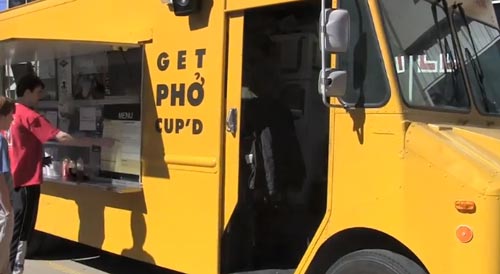Food on the go
Wardah Ajaz
The Signal
The food truck trend is sweeping across states with new and creative street food delights. While cities like Austin, Portland and San Francisco have thriving food truck scenes, Houston is not far behind with its kitchens-on-wheels.
The aroma of the food mixed with loud booming music seems to attract long lines of customers. The old, dirty image of an unsanitary street vendor has turned into fun-filled party food trucks with lots of options, including low calorie fare.
“We try to keep everything under 200 calories and use seasonal ingredients that gives freshness in our crepes,” said Sean Carroll, owner of Melange Creperie, a crepe food truck in Houston.
As the economic downturn continues, more and more people turn toward running a food truck instead of opening a restaurant.
“A restaurant costs up to half a million dollars while it costs about 60 – 80 thousand dollars to own a truck and set-up the business,” Carroll said.
The growing food truck businesses are coming up with new and creative food items at affordable prices to attract customers. The wide variety of menus feature foods ranging from a bowl of rice at around $3 to juicy grilled burgers at around $5.
“When something is new, people want to try it and see if it is any good,” said Naila Johnson, food cart customer. “If it falls under the right price range, then why not give it a try?”
The fact that food trucks are able to literally go to their customers also makes them appealing. Food trucks have the advantage of choosing their location everyday and if one location does not work, they can move to another. You can find them at parking lots, parks and even universities.
The Melange Creperie is located in front of Mango’s Café at the corner of Westheimer and Taft in Houston.
“Most of our customers are people from the neighborhood we are in,” mentioned Carroll, “we have people who moved here from different locations, walkers, bicyclers, construction workers and even the postman.”
Food trucks have become popular due in large part through the use of the social networking sites like Facebook and Twitter to keep their customers up to date about their hours of operation and locations. They use the sites to advertise specials and to attract new customers.
“Eating from a food truck is an experience, and that is why I am a regular food truck eater,” Johnson said. “I like the variety of finger foods and desserts that are offered.”
Far removed from the old “roach coaches” feared in the past, today’s food carts are inspected annually in order to have their permit renewed.
“We are inspected twice as much compared to a regular restaurant,” Carroll said.
As the popularity of food trucks increase in Houston, The Houston Department of Health and Human Services Bureau of Consumer Health Service conducts citywide programs to prevent food diseases and ensure healthy food is being sold by restaurants, including those on wheels.
“We want to have a safe food supply,” said Robert Stine, mobile food unit supervisor. “We also make sure that the food trucks are not causing any environmental violations.”
One of the things health inspectors focus on is the water service. Water for restaurants is provided by the city whereas, water for food trucks has to be provided by the owners. It is illegal for food trucks to dump their dirty water on the streets.
“I usually judge a truck by its appearance from the outside. If it isn’t clean from the outside, I don’t trust it to be clean on the inside,” Johnson said, “I also look at the trucks rating before eating.”
Food trucks are the new trend capturing a lot of people’s attention with a large selection of easy to eat, affordable food items and desserts.
The owner of Melange Creperie points out two good things about food trucks.
“They are fast,” Carroll said. “And they are like a drive-thru with easy access.”
Reaching the consumers on wheels, keeping them updated, and following the health and safety regulations play a huge role in a food truck’s success.
“I would not eat that food from the cafeteria,” said Rachel Hoffan, behaviour analyst program graduate. “If we had a food truck on campus with good food I will eat it and pay for it.”
Video shot and edited by The Signal reporter Kevin Aguilar.


Hello Wardah, thank you for including us in your article; I just need to clear up a few inconsistencies.
We do not keep everything under 200 calories. A crepe itself with nothing on it is 200 calories. We try to keep everything local.
It doesn’t necessarily cost 60-80 grand to start a food truck. It can cost that much at the high end.
A food truck is not as fast as a drive thru, most food trucks are slower than that because they prepare food fresh. Food trucks are like drive thrus in that they are changing the ways that Americans eat. In the 1950s, people thought that drive thrus would be a fad, but they ended up changing the landscape of restaurant culture. We hope that food trucks can do the same.
Thank you,
Sean Carroll